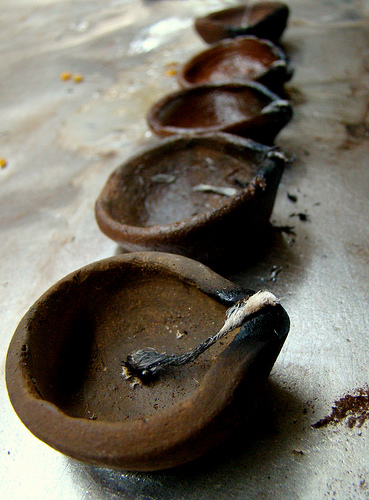FWP:
SETS == STRESS-SHIFTING; WORDPLAY
STRESS-SHIFTING verses: {10,8}; {10,12}*; {17,3}**, discussion;
{17,8}; {27,7}; {35,5};
{36,2}*, {72,4}; {84,4x};
{88,4}; {91,14x};
{93,3x}; {98,5};
{99,6}; {107,5}*; {108,8}; {110,1}*;
{116,1}; {119,6};
{120,10}**; {126,9};
{129,7x}**; {131,9}; {149-10x};
{154,4}; {158,2};
{158,3}; {159,3};
{159,5}; {161,2}**; {163,1}; {166,4}; {173,10};
{183,2}; {189,8}; {193,6x}; {203,3}; {219,3};
{227,3} // {321x,3}; {347x,4}; {389x,3}
Lighting a lamp on someone's tomb is an act of piety and remembrance. It's an oil lamp, so it has a 'tongue' of flame. Or at least, it would if it were lit; but in this verse the speaker is a burnt-out or extinguished, literally 'dead', lamp. Here are some of the points of comparison; as various ones are emphasized, the nuances of interpretation change, in a process I call 'stress-shifting':
=A lamp has a 'tongue', but the speaker's longings are all 'in silence', like those of a poor man or a stranger.
=A lamp has a tongue of flame, but the speaker's longings are all 'hidden' in the dark, like the grave of a poor man or a stranger.
=A lighted lamp has a steady flow of liquid oil that emerges into fire, but the speaker's longings have all turned (or returned) into a mere pool of blood in his heart that is going nowhere, like the longings of a poor man or a stranger.
=A lighted lamp is in some sense alive, but the speaker is a 'dead' or burnt-out or extinguished lamp-- just the kind that would be on the grave of a poor man or a stranger.
It's a verse of mood. The verse is also full of sonorous long vowels, making for fine sound effects and great flowingness.
It's the kind of verse that a traditional audience could enjoy immediately; if Ghalib had written nothing but verses like this, he would never have become the controversial figure he did become.
Compare Mir's shorter and simpler verse M{12,2}.

Nazm:
They call a silent man 'tongueless', and they use the simile of a 'tongue' for the flame of a lamp. So the extinguished lamp is compared to a tongueless man. (11)
== Nazm page 11